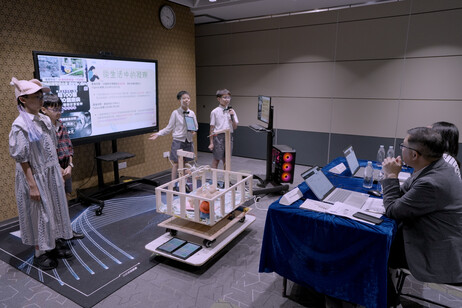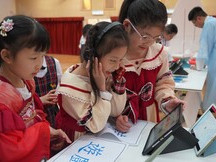EdUHK AIREA International Competition Inspires Schoolchildren to Employ AI in Educational Challenges
The Education University of Hong Kong (EdUHK), in collaboration with the Artificial Intelligence Research and Education Alliance (AIREA), hosted the Pitch Day and Award Presentation Ceremony for the School Category of AIREA International Competition on AI in Education 2025 on 17 June 2025. The competition was met with great enthusiasm, with nearly 200 students and teachers from primary and secondary schools participating, from places including Egypt, Indonesia, Pakistan, Singapore and Turkey, as well as Mainland China, Hong Kong and Taiwan. After rigorous evaluation, 28 teams advanced to the finals and were invited to the Pitch Day to present their innovative AI solutions.
The Competition Awards Presentation Ceremony was attended by EdUHK President Professor John Lee Chi-Kin; Director of Centre for Learning, Teaching, and Technology and Director of University Research Facility of Data Science and Artificial Intelligence, Professor Xu Guandong; Director of the Artificial Intelligence and Digital Competency Education Centre, Professor Kong Siu-cheung; Distinguished Professor Hsu Tingchia from National Taiwan Normal University; and Dr Zhang Jinbao from Beijing Normal University.
In his opening remarks, Professor Lee highlighted AI’s transformative potential in nurturing creativity and innovation, emphasising the competition’s role in advancing AI education. Professor Kong explained the competition’s aims: to cultivate AI literacy, computational thinking and creative problem-solving among students. Dr Seow Senkee of Nanyang Technological University and Mr Chu Ka-tim, Chairman of the Hong Kong Association for Computer Education (HKACE), who served as Co-Chairs of the competition’s School Category, also gave a video message of encouragement to the participants.
The competition was divided into three Stream:
- Stream 1: School of Science and Technology, Singapore was crowned champions in the School Category with their project ‘Using AI to help teachers track students' contributions in group discussions’. Addressing the challenge of unequal participation in collaborative learning, the students proposed an AI-powered interaction analysis tool leveraging Natural Language Processing (NLP), speech diarisation and real-time transcription. This innovative solution enables educators to monitor individual contributions, detect disengagement, and gain data-driven insights to foster equitable group dynamics.
- Stream 2: Shatin College (Hong Kong) emerge as the winner with their project, “SafeSpaceAI”, Their AI-driven sex education platform identifies gaps in traditional curricula, delivers personalised, stigma-free guidance through NLP chatbots, and employs LSTM models to flag urgent student needs – triggering timely counsellor interventions.
- Stream 3: Ying Wa Primary School (Hong Kong) triumphed with “Ying Wa AI NewBorn Parents Assistant.” This AI-powered tool detects infant distress signals, provides automated soothing responses, and alerts caregivers to potential health concerns, thereby enhancing infant safety while alleviating the physical and mental strain on new parents.
At the end of the ceremony, Professor Xu concluded the event by sharing key insights, revealing that more than 200 submissions had been received across all categories from over 18 countries and regions. He revealed the upcoming Higher Education and Open Category Pitch Day and Award Ceremony in August 2025 and announced that the second edition of the competition would launch in 2025/26, continuing its mission to inspire future innovators.
The AIREA International Competition stands as a powerful testament to AI’s capacity to address educational challenges worldwide. Through cutting-edge solutions and cross-border collaboration, young minds have demonstrated how AI can drive meaningful changes in learning and teaching environments. EdUHK and AIREA are committed to inspiring and nurturing the next generation of tech and education leaders, encouraging them to push beyond boundaries with innovative thinking, AI technologies, as well as foster collaborations in AI education, research, and application, and build a more inclusive and responsible AI ecosystem.
-Ends-





